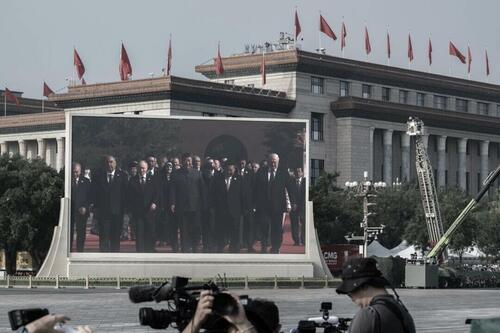Authored by Eva Fu & Frank Fang via The Epoch Times,
China’s state-owned broadcaster has rescinded international wire agency access to a hot mic video of Chinese and Russian leaders discussing longevity and organ transplants, an effort that shows the Chinese regime’s fear of attention on the topic, critics say.
The open mic exchange between Russian President Vladimir Putin and Chinese leader Xi Jinping took place in Beijing on Sept. 3, as the two leaders walked together ahead of a military parade commemorating World War II.
Xi at the parade told Putin that “these days at 70 you are still a child,” prompting Putin to remark that continued organ transplants could allow one to live younger and even reach immortality. Xi in response said that it is predicted that there’s a chance of humans living to 150 years old.
The conversation became global news and sparked discussions about the Chinese regime’s state-sanctioned forced organ harvesting, a taboo topic in China. CCTV has since taken down the livestream video that captured the exchange and removed the moment from replays.
CCTV also sent a letter through its lawyer to Reuters—which licensed the video through CCTV and edited it into a four-minute clip—requesting the news agency to remove the footage on the grounds that the clips Reuters published exceeded the agreed-upon scope.
CCTV lawyer He Danning claimed Reuters’ “editorial treatment applied to this material has resulted in a clear misrepresentation of the facts and statements contained within the licensed feed.”
Reuters withdrew the video and issued a “kill” notice to its clients on Sept. 5. The agency said it had earlier distributed the clip to more than 1,000 media clients around the world, including major international news broadcasters and TV stations.
In a statement, Reuters said it was removing the content because it no longer has the legal permission to publish this copyrighted material.
“We stand by the accuracy of what we published. We have carefully reviewed the published footage, and we have found no reason to believe Reuters longstanding commitment to accurate, unbiased journalism has been compromised,” Reuters stated.
According to the London-based China Tribunal, forced organ harvesting has taken place in China for years “on a significant scale,” and practitioners of the Falun Gong spiritual group are the primary victims. It said that persecuted religious minorities including Uyghurs are also potential targets. Since 1999, millions of Falun Gong practitioners have been incarcerated in prisons, labor camps, and other facilities, with hundreds of thousands tortured and untold numbers persecuted to death, according to the Falun Dafa Information Center.
The International Coalition to End Transplant Abuse in China (ETAC), an Australian advocacy group comprising lawyers, medical professionals, researchers, and human rights advocates, said it was not surprised by CCTV’s demand, considering that organ transplants in China “are linked to crimes against humanity.”
“The now-withdrawn ‘hot mic’ recording between Xi and Putin highlighted the possibility of using organ transplants to seek immortality, rather than to treat seriously ill patients,” ETAC said in a statement to The Epoch Times.
“Such a conversation in China immediately raises the spectre of forced organ harvesting from prisoners of conscience.”
The group said the incident should be “a reminder of the responsibility of media outlets to resist undue influence, the necessity for governments to respect press freedom, and the urgency of addressing credible allegations of forced organ harvesting and other human rights abuses in China.”
“Efforts to suppress or dilute media coverage risk silencing victims and obstructing informed public debate. Independent journalism is critical in holding governments accountable, especially when issues involve systemic human rights violations.”
Two pieces of U.S. legislation that aim to sanction perpetrators of forced organ harvesting—the Stop Forced Organ Harvesting Act and the Falun Gong Protection Act—have already been approved by the House. The Uyghur Genocide Accountability and Sanctions Act of 2025, introduced a month ago to both the Senate and the House, seeks to expand sanctions of the existing law, the Uyghur Human Rights Policy Act of 2020, regarding the human rights abuses in the predominantly Muslim Uyghur Xinjiang region.
“Each addresses forced organ harvesting in distinct ways, and swift passage is critical to avoid U.S. complicity in these crimes,” ETAC stated. “The international community cannot afford selective silence when fundamental human rights are at stake.”
Loading recommendations...
